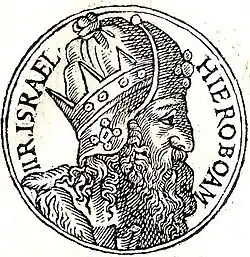Jeroboam II

Jeroboam II, also referred to as Jeroboam son of Jehoash, was the successor of Jehoash (alternatively spelled Joash) and the thirteenth king of the ancient Kingdom of Israel, over which he ruled for forty-one years in the eighth century BC. His reign was contemporary with those of Amaziah (2 Kings 14:23) and Uzziah (2 Kings 15:1), kings of Judah. Jeroboam is the fourth king of the House of Jehu and the longest-reigning king of the kingdom of Israel in Samaria. He is described as a military commander who fought Syria.
Quotes about
- Then Amaziah the priest of Bethel sent a message to Jeroboam king of Israel: “Amos is raising a conspiracy against you in the very heart of Israel. The land cannot bear all his words. 11 For this is what Amos is saying:
“‘Jeroboam will die by the sword,
and Israel will surely go into exile,
away from their native land.’”- Amos 7,10-11 (NKJV).
- In the fifteenth year of Amaziah the son of Joash, king of Judah, Jeroboam the son of Joash, king of Israel, became king in Samaria, and reigned forty-one years. And he did evil in the sight of the Lord; he did not depart from all the sins of Jeroboam the son of Nebat, who had made Israel sin. He restored the territory of Israel from the entrance of Hamath to the Sea of the Arabah, according to the word of the Lord God of Israel, which He had spoken through His servant Jonah the son of Amittai, the prophet who was from Gath Hepher. For the Lord saw that the affliction of Israel was very bitter; and whether bond or free, there was no helper for Israel. And the Lord did not say that He would blot out the name of Israel from under heaven; but He saved them by the hand of Jeroboam the son of Joash.
- 2 Kings 14,23-27 (NKJV).
- [Amos] He preached during the reign of Jeroboam II (783-743), a glorious era in human terms, when the northern kingdom expanded and grew rich, but when the luxury of the powerful was an insult to the misery of the oppressed and the splendour of worship masked the absence of true religion.
- Predica sotto il regno di Geroboamo II (783-743), epoca umanamente gloriosa, in cui il regno del nord si estende e si arricchisce, ma in cui il lusso dei grandi è un insulto alla miseria degli oppressi e in cui lo splendore del culto maschera l'assenza di una religione vera.
- Jerusalem Bible, as quoted in La Bibbia di Gerusalemme, Edizioni Dehoniane, Bologna, 1999. ISBN 88-10-80526-7, p. 1539.
- Predica sotto il regno di Geroboamo II (783-743), epoca umanamente gloriosa, in cui il regno del nord si estende e si arricchisce, ma in cui il lusso dei grandi è un insulto alla miseria degli oppressi e in cui lo splendore del culto maschera l'assenza di una religione vera.